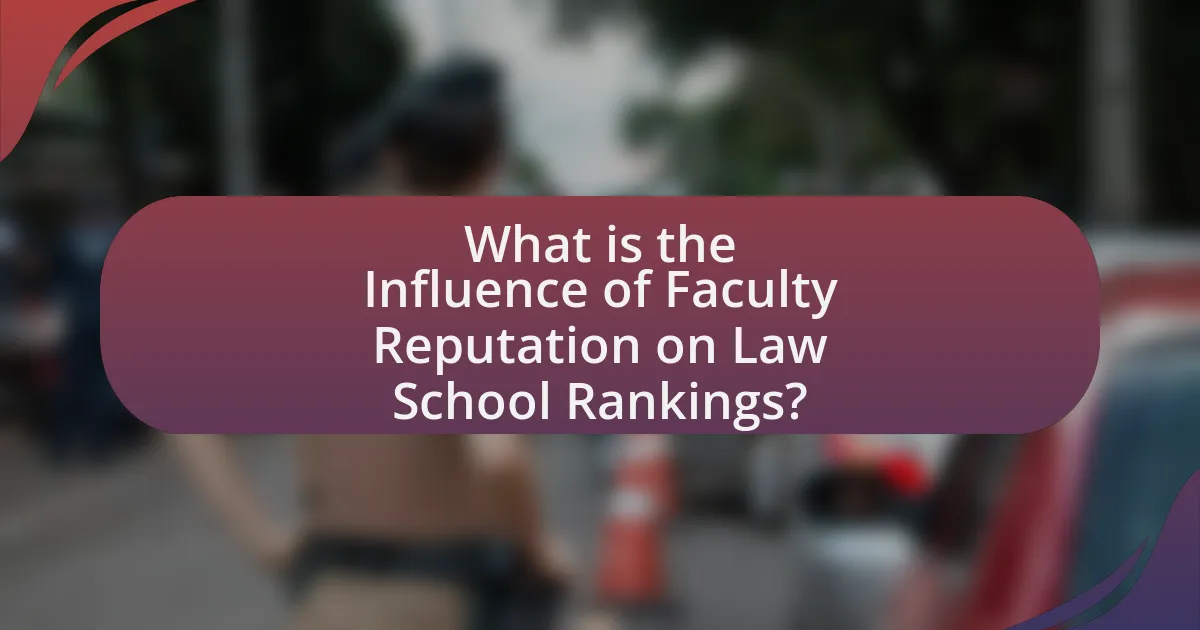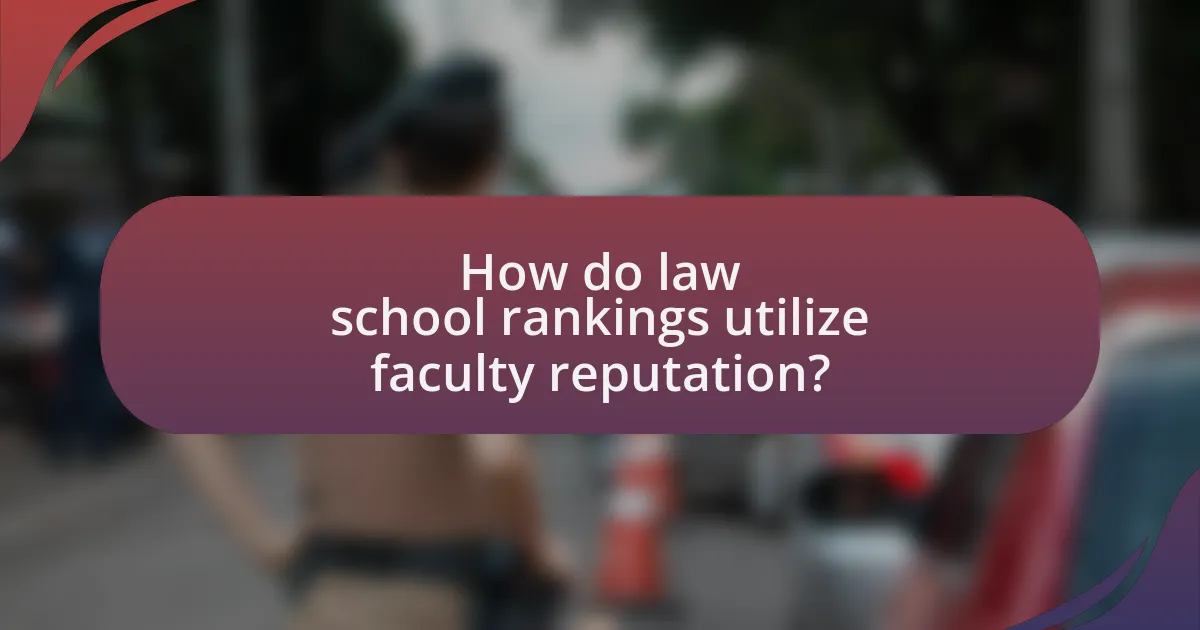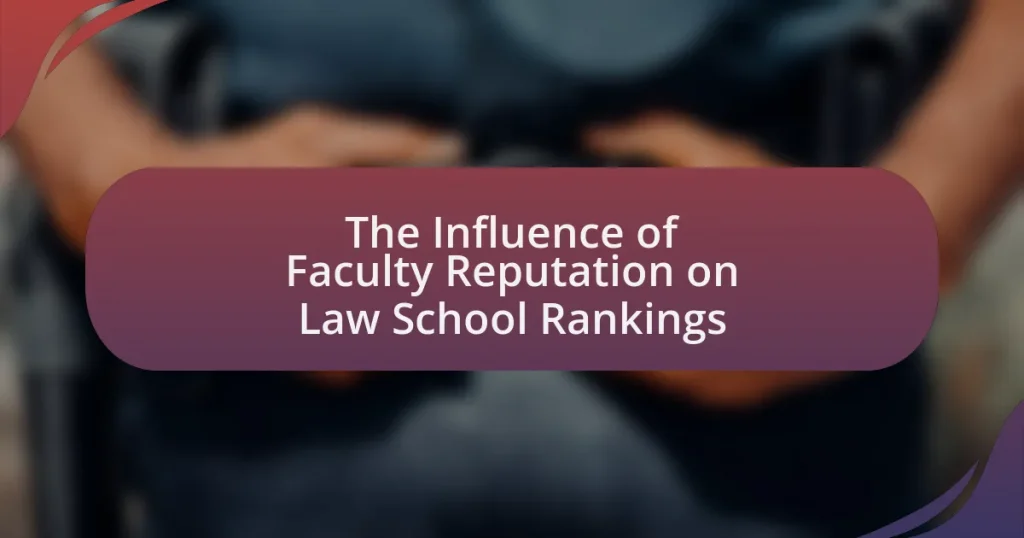The article examines the significant influence of faculty reputation on law school rankings, highlighting how esteemed faculty members contribute to higher rankings through their academic credentials, research output, and teaching effectiveness. It discusses the methodologies used to assess faculty reputation, including peer evaluations and publication metrics, and emphasizes the correlation between faculty quality and student outcomes, institutional prestige, and job placement for graduates. Additionally, the article outlines the challenges law schools face in enhancing faculty reputation and suggests strategies for improvement, underscoring the critical role faculty reputation plays in the competitive landscape of legal education.

What is the Influence of Faculty Reputation on Law School Rankings?
Faculty reputation significantly influences law school rankings. Law schools with highly regarded faculty members often achieve higher rankings due to the faculty’s contributions to legal scholarship, teaching quality, and professional networks. For instance, the U.S. News & World Report rankings consider faculty credentials, including publications and academic achievements, as key metrics. Schools like Harvard and Yale consistently rank at the top, largely due to their distinguished faculty who are leaders in their fields. This correlation between faculty reputation and rankings is supported by research indicating that faculty quality directly impacts student outcomes and institutional prestige.
How does faculty reputation impact law school rankings?
Faculty reputation significantly impacts law school rankings by influencing perceptions of academic quality and the institution’s overall prestige. Law schools with highly regarded faculty attract better students, secure more funding, and enhance their research output, all of which contribute to improved rankings. For instance, the U.S. News & World Report rankings heavily weigh faculty credentials, including publications and academic achievements, as key indicators of a law school’s quality. This correlation is evident in the fact that top-ranked law schools often feature faculty who are leaders in their fields, thereby reinforcing the importance of faculty reputation in determining overall rankings.
What factors contribute to faculty reputation in law schools?
Faculty reputation in law schools is primarily influenced by their academic credentials, research output, teaching effectiveness, and professional experience. Academic credentials, such as advanced degrees from prestigious institutions, establish a baseline of expertise. Research output, including publications in reputable law journals, enhances visibility and credibility within the legal community. Teaching effectiveness, often assessed through student evaluations and peer reviews, reflects the faculty’s ability to engage and educate students. Professional experience, including practice in law firms or judicial clerkships, adds practical insights that enrich the educational environment. Collectively, these factors contribute to a faculty’s standing, which significantly impacts the overall reputation of the law school.
How is faculty reputation measured in the context of law schools?
Faculty reputation in law schools is measured primarily through peer assessments, faculty publications, and the professional achievements of faculty members. Peer assessments involve surveys conducted among legal professionals and academics who evaluate the quality of faculty at various institutions. Faculty publications, including articles in prestigious law journals, contribute to reputation by showcasing scholarly impact and expertise. Additionally, the professional achievements of faculty, such as judicial appointments, involvement in significant legal cases, and contributions to legal education, further enhance their reputation. These factors collectively influence law school rankings, as institutions with highly regarded faculty tend to receive higher evaluations in ranking methodologies.
Why is faculty reputation important for law schools?
Faculty reputation is crucial for law schools because it directly impacts the institution’s ranking and attractiveness to prospective students. A strong faculty reputation enhances the perceived quality of education, as faculty members with notable achievements, such as published works and professional accolades, contribute to a school’s academic prestige. According to the U.S. News & World Report, faculty quality is a significant factor in law school rankings, influencing both student applications and the overall success of graduates in the legal field. Thus, law schools with reputable faculty tend to attract better students and secure higher placement rates for their graduates, reinforcing the importance of faculty reputation in the competitive landscape of legal education.
What role does faculty reputation play in attracting students?
Faculty reputation significantly influences student attraction to law schools. A strong faculty reputation often correlates with high-quality education, expert knowledge, and networking opportunities, making the institution more appealing to prospective students. Research indicates that students prioritize faculty credentials, such as publications and professional experience, when selecting a law school. For instance, a study published in the Journal of Legal Education found that 70% of prospective law students consider faculty reputation a critical factor in their decision-making process. This demonstrates that a well-regarded faculty can enhance a law school’s attractiveness, ultimately impacting its enrollment numbers and overall rankings.
How does faculty reputation influence job placement for graduates?
Faculty reputation significantly influences job placement for graduates by enhancing the perceived value of the education received. Graduates from institutions with highly regarded faculty often benefit from stronger networks, increased recruitment opportunities, and higher employer trust in their capabilities. Research indicates that law firms and employers prioritize candidates from schools with esteemed faculty, as these institutions are associated with rigorous academic standards and successful alumni. For instance, a study by the American Bar Association found that graduates from top-ranked law schools, which typically have renowned faculty, experience higher employment rates and starting salaries compared to those from lower-ranked institutions. This correlation underscores the critical role faculty reputation plays in shaping career prospects for graduates.

What are the key components of faculty reputation?
The key components of faculty reputation include academic qualifications, research output, teaching effectiveness, and professional engagement. Academic qualifications refer to the degrees and credentials held by faculty members, which establish their expertise in their fields. Research output encompasses published works, citations, and contributions to scholarly discourse, indicating the faculty’s influence and recognition in academia. Teaching effectiveness is assessed through student evaluations and peer reviews, reflecting the faculty’s ability to convey knowledge and engage students. Professional engagement involves participation in conferences, editorial boards, and community service, showcasing the faculty’s commitment to their discipline and the broader legal community. These components collectively shape the perception of faculty reputation, which significantly impacts law school rankings.
How do academic qualifications affect faculty reputation?
Academic qualifications significantly enhance faculty reputation by establishing credibility and expertise in their respective fields. Faculty members with advanced degrees, such as PhDs or JDs from prestigious institutions, are often perceived as more knowledgeable and capable, which directly influences their standing among peers and students. Research indicates that law schools with faculty who possess higher academic qualifications tend to achieve better rankings, as these qualifications are associated with rigorous scholarship and teaching excellence. For instance, a study published in the Journal of Legal Education found that faculty credentials, including degrees from top-tier law schools, correlate positively with institutional reputation and student satisfaction.
What degrees and credentials are most valued in law faculty?
The most valued degrees and credentials in law faculty are typically a Juris Doctor (JD) from an accredited law school, advanced degrees such as a Master of Laws (LLM) or Doctor of Juridical Science (SJD), and significant scholarly publications in reputable legal journals. Faculty members with a JD from top-tier law schools, such as Harvard or Yale, often enhance the institution’s reputation and ranking. Additionally, credentials like bar admission and practical legal experience, including judicial clerkships or positions in prestigious law firms, are highly regarded. Research indicates that faculty with strong academic backgrounds and professional accomplishments contribute positively to law school rankings, as evidenced by the U.S. News & World Report’s methodology, which emphasizes faculty credentials as a key factor in evaluating law schools.
How does research output contribute to faculty reputation?
Research output significantly enhances faculty reputation by demonstrating expertise and scholarly contributions in a specific field. High-quality publications in reputable journals indicate that faculty members are engaged in cutting-edge research, which elevates their standing among peers and within academic communities. For instance, a study published in the “Journal of Higher Education” found that faculty members with a higher volume of published research are often perceived as more knowledgeable and credible, leading to increased recognition and respect from colleagues and institutions. This recognition can directly influence law school rankings, as faculty reputation is a critical metric in evaluating academic programs.
What role does teaching effectiveness play in faculty reputation?
Teaching effectiveness significantly enhances faculty reputation by directly impacting student satisfaction and learning outcomes. When faculty members demonstrate strong teaching skills, they foster a positive learning environment, which leads to higher student evaluations and recommendations. Research indicates that institutions with faculty known for effective teaching often receive better rankings, as these faculty members contribute to the overall academic experience and success of their students. For instance, a study published in the Journal of Higher Education found that teaching quality is a critical factor influencing institutional reputation and student enrollment decisions. Thus, effective teaching not only elevates individual faculty members’ standing but also enhances the institution’s reputation in the competitive landscape of law school rankings.
How is teaching effectiveness evaluated in law schools?
Teaching effectiveness in law schools is evaluated through a combination of student evaluations, peer reviews, and teaching portfolios. Student evaluations provide direct feedback on the instructor’s teaching methods, clarity, and engagement, often influencing faculty assessments and tenure decisions. Peer reviews involve faculty members observing and assessing each other’s teaching practices, which fosters a collaborative environment for improvement. Teaching portfolios, which include syllabi, assignments, and reflective statements, allow instructors to showcase their teaching philosophy and effectiveness over time. Research indicates that these methods collectively contribute to a comprehensive understanding of teaching quality, impacting faculty reputation and, consequently, law school rankings.
What impact does student feedback have on faculty reputation?
Student feedback significantly impacts faculty reputation by shaping perceptions of teaching effectiveness and engagement. Positive feedback can enhance a faculty member’s standing within the academic community, leading to increased recognition and opportunities, while negative feedback can diminish their reputation and career prospects. Research indicates that student evaluations are often used in tenure and promotion decisions, underscoring their influence on faculty reputation. For instance, a study published in the Journal of Higher Education found that faculty members with higher student evaluation scores were more likely to receive favorable tenure outcomes, demonstrating the direct correlation between student feedback and faculty reputation.

How do law school rankings utilize faculty reputation?
Law school rankings utilize faculty reputation by incorporating surveys and assessments of faculty members’ scholarly contributions, teaching effectiveness, and professional achievements. These rankings often rely on peer evaluations from legal professionals and academics who rate the faculty’s influence and standing within the legal community. For instance, U.S. News & World Report’s law school rankings include a significant portion of the score based on the reputation of the faculty, which is derived from surveys sent to legal educators and practitioners. This method quantifies faculty reputation, reflecting its impact on the overall ranking of law schools.
What methodologies are used to incorporate faculty reputation into rankings?
Methodologies used to incorporate faculty reputation into rankings include surveys, peer assessments, and citation analysis. Surveys often gather opinions from academic peers regarding faculty quality, while peer assessments involve evaluations from faculty members at other institutions. Citation analysis examines the frequency and impact of faculty publications in scholarly journals, reflecting their influence in the academic community. These methodologies are validated by studies showing that faculty reputation significantly correlates with overall institutional rankings, as evidenced by the U.S. News & World Report’s ranking system, which heavily weighs peer assessments in its methodology.
How do different ranking organizations assess faculty reputation?
Different ranking organizations assess faculty reputation primarily through surveys and peer evaluations. For instance, organizations like U.S. News & World Report conduct annual surveys where law school deans and faculty members rate the reputation of their peers at other institutions. This method relies on subjective assessments, which are aggregated to create a reputation score. Additionally, the QS World University Rankings incorporates academic reputation as a key metric, using data from global surveys of academics to gauge faculty quality. These approaches highlight the reliance on expert opinion and peer recognition in evaluating faculty reputation, which significantly influences overall law school rankings.
What weight does faculty reputation carry in overall law school rankings?
Faculty reputation significantly influences overall law school rankings, often accounting for a substantial portion of the evaluation criteria. For instance, in the U.S. News & World Report rankings, faculty reputation is weighted at 40%, reflecting its critical role in assessing a law school’s quality. This weight underscores the importance of faculty credentials, scholarly output, and peer assessments in shaping perceptions of a law school’s academic standing.
What are the implications of faculty reputation on law school rankings?
Faculty reputation significantly impacts law school rankings, as it is a critical factor considered by ranking organizations. High faculty reputation correlates with better student outcomes, increased research output, and enhanced institutional prestige, all of which contribute to a law school’s overall ranking. For instance, the U.S. News & World Report rankings heavily weigh faculty credentials, including scholarly publications and professional achievements, which directly reflect faculty reputation. This relationship underscores the importance of faculty in shaping the academic environment and attracting prospective students, thereby influencing the law school’s competitive standing.
How can law schools improve their rankings through faculty reputation?
Law schools can improve their rankings through faculty reputation by hiring distinguished faculty members who have notable academic credentials and professional achievements. Faculty members with strong reputations often contribute to higher quality research output, which is a significant factor in ranking methodologies used by organizations such as U.S. News & World Report. For instance, law schools that employ faculty who are published in top-tier legal journals or who have held prestigious positions, such as judges or government officials, tend to attract more applicants and enhance their overall academic standing. This correlation is supported by data indicating that faculty quality accounts for a substantial portion of the ranking criteria, including peer assessments and scholarly impact.
What challenges do law schools face in enhancing faculty reputation?
Law schools face several challenges in enhancing faculty reputation, primarily due to competition for top-tier faculty, limited funding for research, and the need for faculty to balance teaching and scholarship. The competition for attracting renowned scholars is intense, as many law schools vie for a small pool of highly qualified candidates, making it difficult to build a distinguished faculty. Additionally, funding constraints often limit the resources available for faculty research initiatives, which are crucial for establishing a strong academic reputation. Furthermore, faculty members are frequently required to juggle teaching responsibilities with their research commitments, which can hinder their ability to publish influential work and gain recognition in their fields. These factors collectively impede law schools’ efforts to enhance faculty reputation, which is essential for improving overall rankings.
What strategies can law schools implement to enhance faculty reputation?
Law schools can enhance faculty reputation by promoting faculty research, encouraging public engagement, and fostering collaboration with legal practitioners. Faculty research is critical, as publications in reputable journals significantly boost visibility and credibility; for instance, law schools with faculty who publish frequently in top-tier journals often rank higher. Public engagement, such as participating in community legal education or media commentary, enhances faculty visibility and demonstrates expertise, which positively influences reputation. Additionally, collaboration with legal practitioners through guest lectures or joint research projects can strengthen ties to the legal community, further enhancing faculty standing and, consequently, the law school’s reputation.



